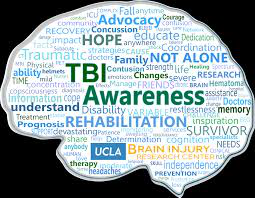Traumatic Brain -- Injury Can an old head injury suddenly cause detrimental effects much later in life?
Although a brain injury from a car accident or a collision during a football game often seems to cause a sudden change to cognitive ability years later, this change does not just appear out of the blue—the damage has been building up slowly, unnoticed, over time.
Postinjury, the progressive brain deterioration that may occur likely reaches a tipping point, after which the loss of function “suddenly” becomes obvious. Depending on the type and severity of the traumatic brain injury (TBI), it can accelerate memory loss or increase a person’s chance of succumbing to Alzheimer’s disease.

TBI commonly damages nerve fibers in the brain called axons. These thin, tube-like structures transmit electrical and chemical signals that are vital for carrying information among different regions of the brain. For unknown reasons, these fragile structures not only disconnect shortly after injury but can continue to disconnect even for decades later in some patients. Once disconnected, the blunt end of an axon seals itself off, swells with fluids, enzymes and proteins and eventually bursts. When axons burst open, they often distribute amyloid proteins through the neighboring brain tissue. These sticky proteins are a hallmark of Alzheimer’s, and in fact, many TBI patients exhibit signs of dementia later in life that mimics the deterioration observed in Alzheimer’s patients.
In addition, with axons disappearing or not functioning well after TBI, a person’s ability to process new information may slow down. Surviving axons may compensate for the damage by increasing electrical signaling and thus restore the normal speed of information processing in the brain. This temporary fix, however, can cause these axons to become even more sensitive to damage if a second concussion occurs.
Most people with TBI will have progressive axonal damage, but it is difficult to predict who will suffer from cognitive changes years later. TBIs have a devastating effect on society, with more than 1.5 million cases documented in the U.S. every year. Currently, no therapies exist for either short- or long-term damage, which means for now the best treatment is protection and prevention.
Conference: International Conference on Central Nervous System and Therapeutics
Dates &Venue: November 12-14, Paris, France.
Website: https://goo.gl/gLAz7N
Dates &Venue: November 12-14, Paris, France.
Website: https://goo.gl/gLAz7N
Comments
Post a Comment